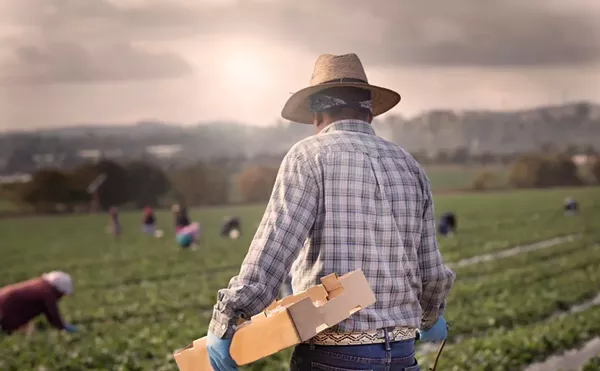
Audio By Carbonatix
[
{
"name": "GPT - Leaderboard - Inline - Content",
"component": "35519556",
"insertPoint": "5th",
"startingPoint": "3",
"requiredCountToDisplay": "3",
"maxInsertions": 100,
"adList": [
{
"adPreset": "LeaderboardInline"
}
]
}
]
A long time ago I made a decision about buying stuff. If I couldn't get it in Detroit I didn't need it.
That was in the 1970s and I maintained that stance for about 10 years. I had a live-in job downtown as a church caretaker and did most of my food shopping at the Cass Corridor Food Co-op. I rode a bicycle almost anywhere I cared to go and could catch the Dexter bus across from where I was living and get off two blocks from my parents' home.
As my needs became more diverse, I found there were things I wanted that I couldn't get in the city. And the things I could get in Detroit often cost more than in the suburbs. When I wanted to buy my first new car, the choices were severely limited unless I went to the suburbs. Bit by bit I expanded the geography of my spending.
Now I live just south of Eight Mile Road and spend most of my food dollars in Ferndale. The distance between the Ferndale shopping district on Nine Mile and the Seven Mile-Livernois area is about the same, but I get more food options in Ferndale. Besides, the Farmer Jack grocery store on Seven Mile closed a few months ago when the chain retailer went belly-up.
For bulk shopping I head out to the Costco on Stephenson Highway near 13 Mile. I see plenty of my Detroit neighbors there, and in Ferndale.
We're among the lucky ones, because a lot of metro Detroiters are dying for the lack of good food. At least that's the conclusion of a recent study by Mari Gallagher Research and Consulting Group and funded by LaSalle Bank. The report, titled "Examining the Impact of Food Deserts on Public Health in Detroit," said that in the worst-off areas, a group of 100 typical Detroiters can count on lopping 64 years off their collective lives; the report authors don't claim cause and effect, but they do see a connection. Suburbanites aren't off the hook. The report estimates 46.5 years of life are lost per 100 residents in the worst metro areas outside of the city.
Wait a minute! What the hell is a food desert?
According to the study, these are areas where fringe food locations — gas stations, liquor stores, party stores, dollar stores, bakeries, pharmacies and convenience stores — are ... uh ... more convenient than mainstream grocers. In fact, about 550,000 Detroiters, well over half the city population, live in out-of-balance areas where the nearest grocery store is twice as far away as the nearest fringe food location. Combine that with a lack of a good mass transit system and you have a nutrition drought. Those severely out-of-balance areas are defined as food deserts.
The study says that "unless access to healthy food greatly improves, residents will continue to have greater rates of premature illness and death."
Detroit isn't alone. Food and nutrition issues plague every major urban area in the United States. There are diabetes and obesity epidemics across the nation. But, as usual, national problems are magnified in Detroit.
"Detroit is unique in that there are more neighborhoods without this kind of access," says Kami Pothukuchi, a professor of geography and urban planning at Wayne State University. "The extent of food deserts is smaller in other cities."
In addition, since we lost Farmer Jack, Detroit lacks a major supermarket chain. And some of the smaller grocers often don't make the grade. Who can't recall news exposés on past-date meats and other goods on sale at some stores?
The report "confirms what you know in your gut," says Pam Weinstein, market manager at the Northwest Farmers Market, a weekly produce sale organized by the Grandmont-Rosedale Community Association in partnership with the Bushnell Congregational Church.
Efforts like the Northwest Farmers Market, which is open on Thursday afternoons in the church parking lot, are grassroots responses to the nutrition crisis.
"We wanted to provide a farmers market for fresh local produce," says Weinstein. "Our first week we had seven vendors and about 150 shoppers, by the third week we had 12 vendors and over 300 shoppers — people in the neighborhood spread the word. ... You have to grow it or make it yourself to sell it. No reselling."
This puts the Northwest Farmers Market in line with a worldwide local-foods movement, which advocates eating foods grown within 100 miles of where you live. On average, most food travels some 1,300 miles before it reaches the consumer.
Malik Yakini, a community activist who owns the Black Star Community Book Store in Detroit and directs Nsoroma Institute Public School Academy in Southfield, was a participant in the food desert study. Yakini is also a member of the Detroit Black Community Food Security Network, which last week sponsored a harvest festival on the two-acre site near Dexter and Boston, where the organization operates a city farm with the Shrine of the Black Madonna.
"Our primary work is urban agriculture, urban growing in the city of Detroit," says Yakini. "It's a small-scale farm. We mainly sell the food, although we give some away to people in the immediate neighborhood. We're trying to create jobs as a result of urban agriculture"
DBCFSN members conduct soil remediation — removing house foundations and other debris from the earth to make it tillable. Similar projects have sprung up in cities such as Los Angeles, Milwaukee, Chicago and Boston.
"Given the vast number of vacant lots in Detroit, we're creating a model of how we can utilize that space," says Yakini. "We're trying to create greater access to fresh produce, generate income and create jobs. To change the community's vision of what a city is and how space is used in a city. I don't think we're going to feed Detroit on vacant lots but we can grow 10 to 25 percent of the food and that's a significant impact."
City Councilperson JoAnn Watson thinks it's worth exploring. She appointed Yakini to a task force addressing food security issues for the city of Detroit.
The DBCFSN Harvest Festival included information and presentations about health, nutrition and gardening. An activist from Toronto's Afri-Can Food Basket came to discuss the issues. Drafts of the proposed policy for the city of Detroit were passed out and there was a forum for comments and feedback.
Admittedly, local farmers' markets and urban gardening aren't going to fix all the problems. Some solutions need to be worked out at other levels of the community.
"I think that there are many approaches to doing that," says Pothukuchi. "Detroit has a history where stores and neighborhoods have come together and hashed out issues of mutual concern, and come up with agreements such as the Harmony Project which focused on not selling alcohol and tobacco products to minors, keeping stores clean and treating customers with respect. We need to draw on that history to see where neighborhood stores can be helped to increase their capacity to provide healthy food."
In the meantime, a business called Mike's Market has moved into the space where my local Farmer Jack used to be. It hasn't opened yet but the sign outside touts fresh meat and produce.
That's like cool water to a parched palate. But as a Detroiter, I worry about how the rest of us eat.
The food desert report is at lasallebankmidwest.com.
Larry Gabriel is a writer, musician and former editor of Metro Times. Send comments to letters@metrotimes.com





